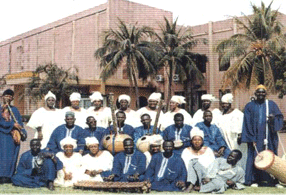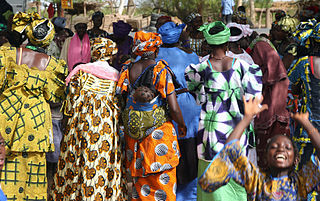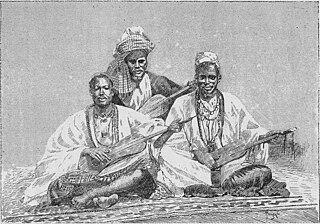Related Research Articles
Bambara, also known as Bamana or Bamanankan, is a lingua franca and national language of Mali spoken by perhaps 14 million people, natively by 4.2 million Bambara people and about 10 million second-language users. It is estimated that about 80 percent of the population of Mali speak Bambara as a first or second language. It has a subject–object–verb clause structure and two lexical tones.

Mali, officially the Republic of Mali, is a landlocked country in West Africa. It is the eighth-largest country in Africa, with an area of over 1,241,238 square kilometres (479,245 sq mi). The country is bordered to the north by Algeria, to the east by Niger, to the northwest by Mauritania, to the south by Burkina Faso and Ivory Coast, and to the west by Guinea and Senegal. The population of Mali is 24,478,595, 47.19% of which are estimated to be under the age of 15 in 2024. Its capital and largest city is Bamako. The country has 13 official languages, of which Bambara is the most commonly spoken, although French is a frequent lingua franca.

The music of Mali is, like that of most West African nations, ethnically diverse, but one influence predominates: that of the ancient Mali Empire of the Mandinka. Mande people make up around 50% of Mali's population; other ethnic groups include the Fula (17%), Gur-speakers 12%, Songhai people (6%), Tuareg and Moors (10%).

A griot is a West African historian, storyteller, praise singer, poet, and/or musician.

The Mandinka or Malinke are a West African ethnic group primarily found in southern Mali, The Gambia, southern Senegal and eastern Guinea. Numbering about 11 million, they are the largest subgroup of the Mandé peoples and one of the largest ethnolinguistic groups in Africa. They speak the Manding languages in the Mande language family, which are a lingua franca in much of West Africa. Virtually all of Mandinka people are adherent to Islam, mostly based on the Maliki jurisprudence. They are predominantly subsistence farmers and live in rural villages. Their largest urban center is Bamako, the capital of Mali.
Sundiata Keita was a prince and founder of the Mali Empire. He was also the great-uncle of the Malian ruler Mansa Musa, who is usually regarded as the wealthiest person of all time, although there are no reliable ways to accurately calculate his wealth.
The Mandé peoples are a linguistic grouping of those African nations who speak Mande languages. The are not a coherent ethnic or cultural group. The various Mandé-speaking nations are concentrated in the western regions of West Africa.

Amadou Hampâté Bâ was a Malian writer, historian, and ethnologist. He was an influential figure in the twentieth-century African literature and cultural heritage. A champion of Africa's oral tradition and traditional knowledge, he is remembered for the saying: "whenever an old man dies, it is as though a library were burning down".

Massa Makan Diabaté was a Malian historian, author, and playwright.

Yambo Ouologuem was a Malian writer. His first novel, Le devoir de violence, won the Prix Renaudot. He later published Lettre à la France nègre (1969), and Les mille et une bibles du sexe (1969) under the pseudonym Utto Rodolph. Le devoir de violence was initially well-received, but critics later charged that Ouologuem had plagiarized passages from Graham Greene and other established authors such as André Schwartz-Bart. Ouologuem turned away from the Western press as a result of the matter, and remained reclusive for the rest of his life.

Habib Koité is a Senegalian-born Malian musician, singer, songwriter and griot based in Mali. His band, Bamada, was a supergroup of West African musicians, which included Kélétigui Diabaté on balafon.
Diarra is a French translation of the clan name Jara used in West Africa, as a hangover from the French colonial empire in that region. It originates from the Bambara language word jara, meaning lion, synonymous with waraba. The Kingdom of Diarra existed from the 7th Century until the 19th Century. The name is also frequently used with reference to the 18th to early 19th-century Bambara Empire in Ségou, Mali, which was ruled successively by Ngolo Diarra, his son Mansong Diarra, and then his son Da Diarra.
Soungalo Coulibaly (1955–2004) was a Malian master drummer.

The culture of Mali derives from the shared experience, as a colonial and post-colonial polity, and the interaction of the numerous cultures which make up the Malian people. What is today the nation of Mali was united first in the medieval period as the Mali Empire. While the current state does not include areas in the southwest, and is expanded far to the east and northeast, the dominant roles of the Mandé people is shared by the modern Mali, and the empire from which its name originates from.

Senegalese literature is written or literary work which has been produced by writers born in the West African state. Senegalese literary works are mostly written in French, the language of the colonial administration. However, there are many instances of works being written in Arabic and the native languages of Wolof, Pulaar, Mandinka, Diola, Soninke and Serer. Oral traditions, in the form of Griot storytellers, constitute a historical element of the Senegalese canon and have persisted as cultural custodians throughout the nation's history. A form of proto-Senegalese literature arose during the mid 19th century with the works of David Abbé Boilat, who produced written ethnographic literature which supported French Colonial rule. This genre of Senegalese literature continued to expand during the 1920s with the works of Bakary Diallo and Ahmadou Mapaté Diagne. Earlier literary examples exist in the form of Qur’anic texts which led to the growth of a form African linguistic expressionism using the Arabic alphabet, known as Ajami. Poets of this genre include Ahmad Ayan Sih and Dhu al-nun.

Cheick Hamala Diabate is a Malian musician, who has been nominated for a Grammy Award. Using Adelphi, Maryland, as his home he travels all over the United States, Canada, Europe, and Asia. He has performed at the Kennedy Center, the United States Senate, and the Smithsonian Institution. Cheick Hamala was born into a griot family in Kita, Mali. From a young age, he learned to play the ngoni, a stringed instrument related to the American banjo. In addition, Cheick has learned the history of Mali passed down for over 800 years. Cheick has performed internationally.

Circa 1230s-1600s, the MaliEmpire was created in Western Africa along the Niger River. Often associated with being founded by Sunjata Keita, the history of Mali is extremely based on oral history. The story of the founder of Mali, Sunjata Keita, is largely based on oral history. Oral history may be defined as the preservation and interpretation of historical, cultural or personal experiences by way of a speaker. In Mali, such a speaker can be described as a poet, a storyteller, a praise singer or a musician. A large amount of Mali's history is transferred via oral historians. Such oral historians in Mali are known as griots, Jalis, and Jelis. The origins of oral history in Mali may be traced back to the story of Sunjata Keita. Modern-day oral history in Mali has transformed from the history based griots to a more contemporary musical and negotiator based griots. The current state of oral history in Mali has travelled to other realms like popular culture and politics.
Mamadou Sidiki Diabaté is a prominent Mandé kora player and jeli from Bamako, Mali. He is the 71st generation of kora players in his family and a son to Sidiki Diabaté.

Cuisine in Mali includes rice and millet as staples of Mali, a food culture heavily based on cereal grains. Grains are generally prepared with sauces made from edible leaves, such as spinach, sweet potato or baobab, with tomato peanut sauce. The dishes may be accompanied by pieces of grilled meat.
Ami Koita, nicknamed "the diva of Mandinga music", is a Malian singer.
References
- Velton, Ross Mali. Bradt Travel Guides (2004) ISBN 1-84162-077-7.
- (in French) Milet, Eric & Manaud, Jean-Luc. Mali. Editions Olizane (2007). ISBN 2-88086-351-1.